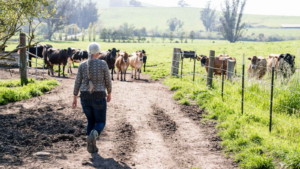To celebrate National Dairy Month, we are highlighting some of the world's most innovative, Non-GMO Project Verified dairy producers. These dairy operations offer regenerative and regionally-specific solutions to the most significant issues facing the dairy industry (e.g., animal welfare, soil health and climate change) — all without GMOs!
Albert Straus knows dairy.
Growing up on his family's dairy farm in Northern California, he learned all about dairy farming and land stewardship from his parents. Today, Straus Family Creamery is a West Coast leader in organic, regenerative and non-GMO dairy farming.
Where conventional dairy stumbles, Straus soars. Their transition to organic was the natural evolution of the family's environmental commitment. Plus, organic production and cutting-edge regenerative thinking secured Straus' future as a viable dairy business. That's no small accomplishment in a famously turbulent industry.
Here's how Straus Family Creamery is rising to the top.
Beyond organic
Straus was on his way to organic production before the label even existed. Throughout the 1970s and 80s, the family farm transitioned pasture land to no-till and reduced chemical use. In 1994, Straus Dairy Farm transitioned fully to organic production, combining Albert Straus’ commitment to land stewardship with a specialized market that hopefully provided financial stability. At the time, Straus Dairy Farm was the first certified organic dairy farm west of the Mississippi River and the first 100% certified organic creamery in the United States.
Under USDA organic certification, dairy cows must receive organic animal feed. However, in 2005, when Albert Straus tested the organic feed he was buying, he found GMOs. (GMOs are prohibited in organic production, but the National Organic Program does not have a testing requirement. GMO contamination can go undetected). Until the Non-GMO Project's formation in 2007, diligent producers such as Albert caught contamination that would otherwise have gone unnoticed.
A visionary after our hearts, Albert Straus began a GMO testing program in 2008, later joining the Non-GMO Project's Product Verification Program. Straus Family Creamery pursued verification for their products in 2010, as soon as the Butterfly label began appearing on shelves.
Beyond waste
Albert Straus regards supply chains and waste streams with creativity and frugality. For years, he has used upcycled food products that would otherwise end up as waste to add nutrition and variety to his cows' diets. In 2021, Straus Dairy Farm participated in the first U.S. commercial trial using red seaweed (Asparagopsis taxiformis) supplementation as a climate change solution. The trial demonstrated that adding roughly 1/4 pound of red seaweed to each cow's diet led to significant "enteric methane emissions'' (a.k.a cow burps). Methane emissions released from burping went down an average of 52%, and as much as 90%.
Cow burps are no small thing. Blue Ocean Barns Co-founder and Seaweed Producer Joan Salwen says, "There's as much climate warming effect from one dairy cow as there is one passenger car over the course of the year."
Methane is also captured from cows’ manure. Straus Family Creamery uses a methane biodigester to produce electricity from the methane in cow manure, turning a problem into a solution. In addition, solid animal waste is turned into valuable compost to feed the soil.
A perfect embodiment of Straus' circular economy is the electric feed truck, the first-of-its kind in the world. The vehicle delivers feed to the cows and is powered by the methane captured from the cows' waste. It doesn't get more circular than that.
Toward a carbon-neutral future
In 2013, Straus Family Creamery was the first dairy in California to adopt a 20-year carbon farm plan. Carbon farming uses a plant's natural ability to take carbon from the atmosphere and put it back into the soil.
The Straus team increases plant photosynthesis using a variety of methods. Perennial grasses with deep root systems are encouraged on no-till pastureland. Herds move through a rotational grazing program that improves the land's health, and the cows naturally fertilize as they go. Carbon farming continues right to the water's edge, where grasses, trees and streamside plants protect wetlands, keep waterways clean and reduce soil erosion. Straus Family Creamery plans to make its supplying farms carbon neutral by 2030.

Tresch Family Farms supplies organic milk to Straus Family Creamery
Being a leader means bringing others along on the journey. Straus Family Creamery also works with its network of small dairy suppliers to help them adopt regenerative carbon farming and climate-positive practices. The Straus Family Creamery’s suppliers are currently on track to be carbon-neutral by 2030.
Straus’ vision for a profitable dairy operation that is carbon-neutral and improves the region's soil and water is a blueprint for the dairy farms of tomorrow. After all, farming is not for the faint of heart. The conventional dairy market infamously clobbers all but the largest operations, forcing farmers to "get big or get out." Scale tends to maximize the worst impacts of industrial-style farming and make innovation harder to implement.Thankfully, Albert Straus' clarity and vision keep the growing business on the right path: "As long as we're keeping the focus on small family farms, keeping land practices and animal welfare and community in mind, it will all work."
Thankfully, Albert Straus' clarity and vision keep the growing business on the right path: "As long as we're keeping the focus on small family farms, keeping land practices and animal welfare and community in mind, it will all work."
